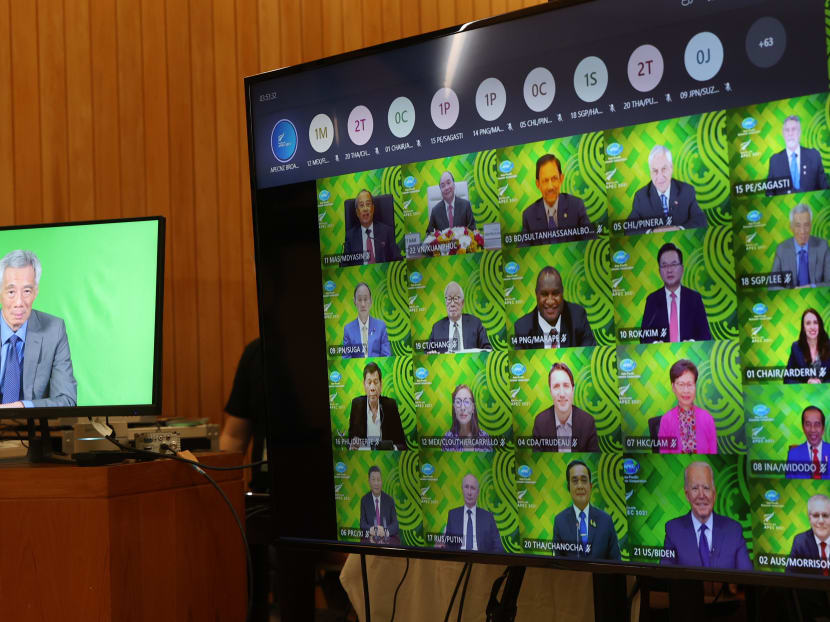Singapore intends to donate its Covid-19 vaccines under Covax initiative to other countries: PM Lee
SINGAPORE — Singapore intends to donate its Covid-19 vaccines under the Covax vaccine-sharing initiative to other countries, Prime Minister Lee Hsien Loong said on Friday (July 16).

Prime Minister Lee Hsien Loong participating in the APEC Informal Leaders' Retreat on July 16, 2021.
SINGAPORE — Singapore intends to donate its Covid-19 vaccines under the Covax vaccine-sharing initiative to other countries, Prime Minister Lee Hsien Loong said on Friday (July 16).
Speaking at the Asia-Pacific Economic Cooperation (APEC) Informal Leaders’ Retreat on Covid-19, Mr Lee said that countries whose vaccination programmes are ahead should make their excess vaccine supplies available to others.
"Within our region, APEC economies should support one another, both for the present and future pandemics. For example, through technical assistance to strengthen national public health capabilities, the last mile," he said.
Singapore's Ministry of Health said on Friday that more than 6.57 million doses of Covid-19 vaccines have been administered under the national vaccination scheme, with more than 2.54 million having completed the full vaccination regimen.
The Covax initiative, run by the World Health Organization (WHO) and its partners, aims to provide "equitable access" to Covid-19 vaccines to people around the globe, said the WHO.
The virtual meeting on Friday was hosted by New Zealand's Prime Minister Jacinda Ardern and was attended by world leaders including US President Joe Biden, Russian President Vladimir Putin, and Chinese President Xi Jinping.
In his speech, Mr Lee said APEC members should take the lead to reconnect economies and pursue trade liberalisation. He noted that the Covid-19 pandemic has disrupted international trade and the movement of people across borders.
"Understandably, countries are working towards more self-reliance, especially for essential goods, but we should not take this too far," Mr Lee said.
"Free trade is still essential to global economic recovery and prosperity and prompt implementation of the WTO (World Trade Organization) Trade Facilitation Agreement will make trade faster and cheaper, and strengthen our supply chains.
"We should also work together to restart international travel safely, by developing common standards for digital vaccine certificates and digital identities."
He added that the pandemic has "accelerated the switch to a digital economy", nothing that Singapore has piloted digital economy agreements with New Zealand, Chile and Australia.
These agreements align rules and standards, and "foster cross-border digital interoperability, data flows and trade", Mr Lee said.
"Beyond Covid-19, the green economy presents another growth opportunity. Like many APEC economies, Singapore is highly vulnerable to the effects of climate change," he added.
Mr Lee mentioned the Singapore Green Plan 2030, a national strategy aimed at mitigating climate change and creating a green, liveable and sustainable city.
"But being a very small country, our own mitigation efforts will have limited impact," he said.
"It is only by working together with others that we can overcome this global challenge, and that is why Singapore is exploring green economy agreements to facilitate trade and investment in environmental goods and services, and strengthen environmental governance and capabilities."
In his speech, Mr Lee called for countries to work together to prepare for the next pandemic.
"Covid-19 will not be the last, nor the most serious pandemic the world will face," he said.
He noted a recent report by the G20 High Level Independent Panel that makes a strong case for a major step-up in collective investments, including a scaled-up global surveillance system for emerging infectious disease outbreaks.
"To enable countries to act early to check the spread of emerging diseases, and get a head-start in developing test kits, vaccines or treatments; and secondly, we need a more agile global governance and financing mechanism that can swiftly plug gaps in global health security," said Mr Lee. CNA
For more stories like this, visit cna.asia.






